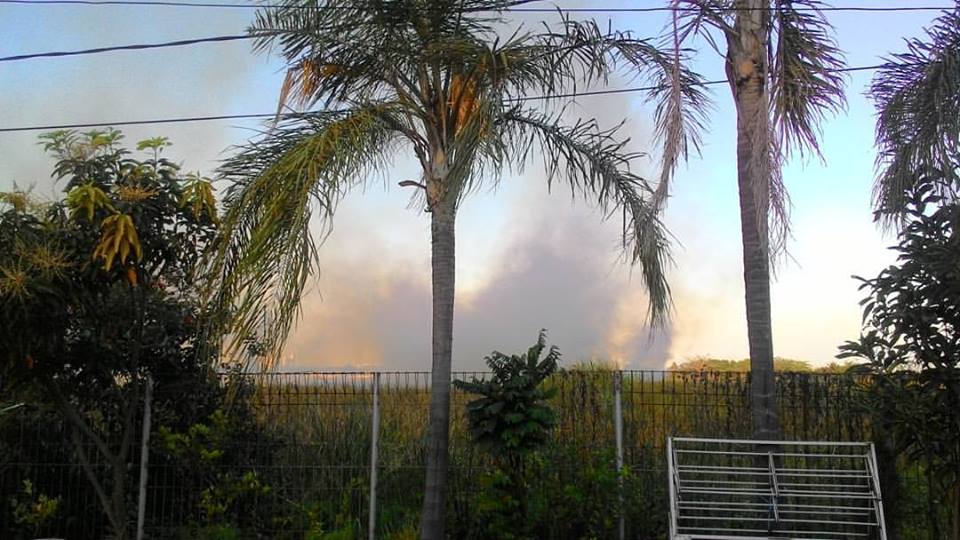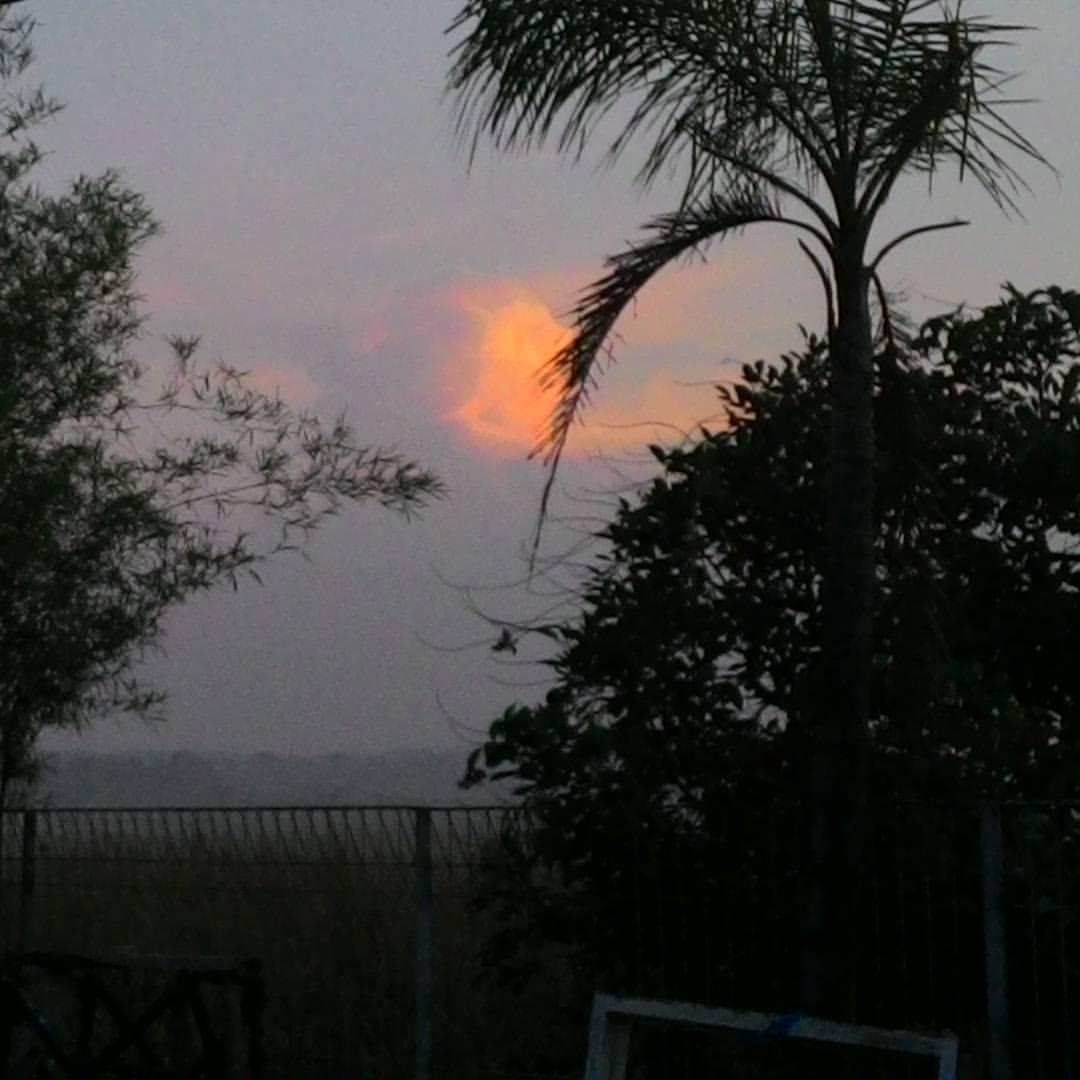I should note that this was originally posted in 1998.
It’s good to be home.
Emily had gone to Bali a few days earlier, as she had some business and both my son and I still had school. On Christmas Eve we got to the airport and boarded our flight to Bali.
Like the song goes … “the weather started getting rough. The tiny ship was tossed. If not for the courage of the fearless crew …” We made three passes over the Island of the Gods, but it wasn’t meant to happen.
The rain was buffeting our sturdy craft. It was impossible to see anything, and then the peanuts ran out.
Well, next thing you know … ol’ Wayne’s back in Surabaya. And Boy howdy, was I ever happy about that. I peppered the air with cries of gosh golly and dad burn it. I’m not happy.
Emily is waiting at the airport for me and her handphone is obviously not working. My handphone has previously given up the ghost. Now I’m using a phone card and trying to find a compatible phone. I find one, but unfortunately, it’s sandwiched between two phones occupied by men talking louder than seems necessary.
I can’t hear a bloody thing. I’m trying to explain the situation to my mother-in-law. She’s a nice lady who I communicate quite well with in person, yet her English doesn’t exist, my Indonesian is poor, the connection sucks and the surrounding noise is unbearable.
Well, I wish everyone a Merry Christmas at the top of my lungs, I compliment their country and their courtesy and I wish them on their way. My son thinks dear old Dad is ready for a new sports coat in that lovely wrap-around style.
Finally, I get through. Everybody’s okay on that side. We waited in Surabaya’s Juanda airport for an hour and a half. Finally, the plane boarded again. It was now 10:00 pm. The flight to Bali is about 35 to 45 minutes. Bali is an hour ahead of Surabaya.
We arrive in Bali at 11:40 p.m. Bali time. It’s drizzling. The taxi driver asks for Rp 40,000. I decline. We walk out to the taxi booth and buy a voucher. We pay Rp 26,000. Christmas Eve passes in the back of a taxi. We arrive.
My wife is at work preparing a shipment of fruit to Hong Kong. I am now a fruit packer. By 12:00 p.m. Christmas day the fruit is packed and on its way. We shower, eat and almost everyone sleeps.
Me, … I’m wired. The rest of our merry band has fallen asleep. The nanny and the cook are watching the kids. The next day the lost sleep will catch up with me. I take a long walk. We were in Denpasar, Bali and it’s hot. I walk for an hour and come back drenched in sweat.
Christmas night we head to Jimbaran.
Jimbaran beach is a long strip of seafood restaurants. You order your food fresh. You pick a table. On the beach, if it’s not raining, under the tents if it is. On a clear night the sound of the surf, the smell of barbecued fish and the majesty of a star-filled sky conspire to bewitch even the most cynical traveler.
The day after Christmas I sleep until 11:00 a.m. I’m still tired when my two nephews and my niece wake me. Chinese-Indonesian children do not play outside and are generally spoiled. I’ve brought some cartoons with me. The VCDs keep them occupied for half an hour.
We head to Kuta that afternoon. We don’t go to the bars or the shopping malls. We find a relatively quiet beach and play in the surf. My son, who’s eighteen, seems more interested in the spectacle of topless women frolicking close by. My head may have turned one or two times. The surf-kissed sand has been rendered almost mirror-like. The sky is a rich blue with traces of white clouds. Gradually the blue becomes purple and the sun is a descending red ball. Pale pinks and rich oranges dominate the fading palate. A tropical sunset is beautiful and abbreviated.
In fifteen minutes, it is dark. The stars are brilliant. Aside from a few moments of temper, the week passes uneventfully. We watch videos on New Years’ Eve. Two days later, we hop in the car and head to Lovina. We’re going to see the Dolphins.
Last episode we left for Lovina to see the dolphins.
Along the way, we pass the site of Gunung Agung’s 1963 eruption. The devastation was massive and thousands died. The Balinese believe that this was because prayers had been interrupted. Now the boulders, once part of Gunung Agung’s crown, are strewn about, but they are covered with lush vegetation. It was another example of nature’s power to repair itself.
I was reminded of a walk along the trails of Canada’s Algonquin Park.
Granted, it probably doesn’t need to be said that it certainly wasn’t similar terrain. A picture from the early years of the last century showed a devastated mountain.Trees, and earth torn away to run a rail line through. Then in the fall 0f 1995, I walked down that same path and tall, healthy trees shaded me. Waist high grass surrounded me. I was shaded by mature pines. Nature will right itself, once given a chance.
Now I stood in the lushness of Gunung Agung’s revival. Gunung is the Indonesian word for mountain, and the center of Bali is a spine of mountains. Many of them are still active volcanoes. As late as 1994 there have been eruptions. They don’t call the Indonesian archipelago the Ring of Fire because of the hot food. We arrived in Lovina. We looked at one place. They wanted RP 300,000 a night. That’s the price of a luxury hotel in Surabaya.
We found the Hotel Padma. We paid Rp 120,000 for each of two rooms, barely enough for myself, Emily, her sister Suzy, our son Adryan, Suzy’s three kids and a family friend. So, it’s guys in one room, and women in the other. The pool was clean large and warmed by the sun. We ate a large dinner and turned in. At 5:00 a.m. we were up and by six o’clock, we were in two traditional boats heading out to see the dolphins. We were about 20 minutes out when the first small pod appeared.
They surfaced, played about and were gone – only to reappear in another area. This went on for half an hour or so. Then a larger group appeared. The two groups surfaced, dived, disappeared, raced the boats and delighted their audience. It is impossible not to feel a little like an alien watcher, privileged to witness a very personal kinship with nature.
The surrounding mountains were mist-cloaked shadows at the water’s edge. The water was black in the pale early morning light, briefly disturbed by our bright-coloured boats and the sleek gray bodies that danced and dived around us.
Then it ended. We had spent almost two hours watching. It was impossible to tell who was more excited, the adults or the children.
After breakfast, Adryan and I went snorkeling. A reef lay about halfway between the shore and where we watched the dolphins. Again, we were in a traditional boat. A narrow canoe like craft with twin outriggers, a small (5.5 horsepower) outboard motor and an inverted, triangular-shaped, lateen sail that also serves to shade our driver/guide as he naps. We don masks and flippers and enter the now blue waters. Colors explode around us. Angelfish, rainbow-hued fish, blue neon tetras and unfortunately a few too many jelly fish. We moved location twice. Adryan managed to find a French coin. Once cleaned, it was revealed as a 1995 coin, but still a find. I had to rescue it from the pool bottom later that evening, so the excitement of discovery was obviously short-lived. We stayed two days then headed back to Denpasar.
We flew home that Saturday.







